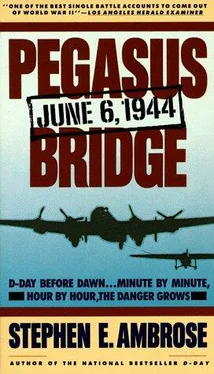Stephen Ambrose - Pegasus Bridge
Здесь есть возможность читать онлайн «Stephen Ambrose - Pegasus Bridge» весь текст электронной книги совершенно бесплатно (целиком полную версию без сокращений). В некоторых случаях можно слушать аудио, скачать через торрент в формате fb2 и присутствует краткое содержание. Жанр: История, на английском языке. Описание произведения, (предисловие) а так же отзывы посетителей доступны на портале библиотеки ЛибКат.
- Название:Pegasus Bridge
- Автор:
- Жанр:
- Год:неизвестен
- ISBN:нет данных
- Рейтинг книги:5 / 5. Голосов: 1
-
Избранное:Добавить в избранное
- Отзывы:
-
Ваша оценка:
- 100
- 1
- 2
- 3
- 4
- 5
Pegasus Bridge: краткое содержание, описание и аннотация
Предлагаем к чтению аннотацию, описание, краткое содержание или предисловие (зависит от того, что написал сам автор книги «Pegasus Bridge»). Если вы не нашли необходимую информацию о книге — напишите в комментариях, мы постараемся отыскать её.
Pegasus Bridge — читать онлайн бесплатно полную книгу (весь текст) целиком
Ниже представлен текст книги, разбитый по страницам. Система сохранения места последней прочитанной страницы, позволяет с удобством читать онлайн бесплатно книгу «Pegasus Bridge», без необходимости каждый раз заново искать на чём Вы остановились. Поставьте закладку, и сможете в любой момент перейти на страницу, на которой закончили чтение.
Интервал:
Закладка:
At Vimont, east of Caen, Colonel Hans A. von Luck, commanding the 125th Panzer Grenadier Regiment of the 21st Panzer Division, was working on personnel reports at his headquarters. The contrast between Schmidt and von Luck extended far beyond their activities at midnight. Schmidt had gone soft from years of cushy occupation duty; von Luck was an officer hardened by combat. He had been in Poland in 1939 and commanded the leading reconnaissance battalion for Rommel at Dunkirk in 1940. At Moscow in the winter of 1941, he actually led his battalion into the outskirts of the city, the deepest penetration of the campaign. And he had been with Rommel throughout the North African campaign of 1942-43.
There was an equally sharp contrast between the units von Luck and Schmidt commanded. The 716th Infantry was a second-rate, poorly equipped, immobile division made up of a hotchpotch of Poles, Russian, French and other conscripted troops, while the 21st Panzer was Rommel's favourite division. Von Luck's regiment, the 125th, was one of the best equipped in the German army. The 21st Panzer Division had been destroyed in Tunisia in April and May, 1943, but Rommel had got most of the officer corps out of the trap, and around that nucleus rebuilt the division. It had all new equipment, including Tiger tanks, self -propelled vehicles (SPV) of all types, and an outstanding wireless communications network. The men were volunteers, young Germans deliberately raised by the Nazis for the challenge they were about to face, tough, well -trained, eager to come to grips with the enemy.
There was a tremendous amount of air activity that night, with British and American bombers crossing the Channel to bomb Caen. As usual, Schmidt paid no attention to it. Neither did von Luck, consciously, but he was so accustomed to the sights and sounds of combat that at about 0010 hours he noticed something none of his clerks did. There were about six planes flying unusually low, at 500 feet or less. That could only mean they were dropping something by parachute. Probably supplies for the Resistance, von Luck thought; he ordered a search of the area, hoping to capture some local resistance people while they were gathering in the supplies.
Heinrich (now Henry) Heinz Hickman, a sergeant in the German 6th (Independent) Parachute Regiment, was at that moment riding in an open staff car, coming from Ouistreham on the coast towards Benouville. Hickman, twenty-four years old, was a combat veteran of Sicily and Italy. His regiment had come to Normandy a fortnight before; at 2300 hours on June 5 his company commander had ordered Hickman to pick up four young privates at observation posts outside Ouistreham and bring them back to headquarters, near Breville on the east side of the river.
Hickman, himself a paratrooper, also had heard low-flying planes. He came to the same conclusion as von Luck, that they were dropping supplies to the Resistance, and for the same reason - he could not imagine that the Allies would make a paratrooper drop with only half-dozen sticks. He drove on towards the bridge over the Caen Canal.
Over the Channel, at 0000 hours, two groups of three Halifax bombers flew at 7,000 feet towards Caen. With all the other air activity going on, neither German searchlights nor AA gunners noticed that each Halifax was tugging a Horsa glider.
Inside the lead glider. Private Wally Parr of D Company, the 2nd Oxfordshire and Buckinghamshire Light Infantry (Ox and Bucks), a part of the Air Landing Brigade of the 6th Airborne Division of the British army, was leading the twenty-eight men in singing. With his powerful voice and strong Cockney accent, Parr was booming out 'Abey, Abey, My Boy'. Billy Gray, sitting down the row from Parr, was barely singing, because all that he could think about was the 'Jimmy Riddle' he had to do. At the back of the glider. Corporal Jack Bailey sang even as he worried about the parachute he was responsible for securing.
The pilot, twenty-four-year-old Staff Sergeant Jim Wall-work, of the Glider Pilot Regiment, anticipated casting off any second now that he had seen the surf breaking over the Norman coast. Beside him his co-pilot, Staff Sergeant John Ainsworth, was concentrating intensely on his stop watch. Sitting behind Ainsworth, the commander of D Company, Major John Howard, a thirty-one-year-old former sergeant major and an ex-cop, laughed with everyone else when the song ended and Parr called out, 'Has the Major laid his kit yet?' Howard suffered from air sickness and had vomited on every training flight. This flight, however, was an exception. Like his men, he had not been in combat before, but the prospect seemed to calm him more than it shook him.
As Parr started up 'It's a Long Way to Tipperary', Howard touched the tiny red shoe in his battlejacket pocket, one of his two-year-old son Terry's infant shoes that he had brought along for good luck. He thought of Joy, his wife, and of Terry and their baby daughter. Penny. They were back in Oxford, living near a factory, and he hoped there were no bombing raids that night. Beside Howard sat Lieutenant Den Brotheridge, whose wife was pregnant and due to deliver any day (five other men in the company had pregnant wives back in England). Howard had talked Brotheridge into joining the Ox and Bucks, and had selected his platoon for the no. 1 glider because he thought Brotheridge and his platoon about the best in his company. Another reason was that they were mostly Londoners like himself. Howard loved the Cockney quick wit and cheerfulness.
One minute behind Wallwork's glider was no. 2, carrying Lieutenant David Wood's platoon. Another minute behind that Horsa was no. 3 glider, with Lieutenant R. A. A. 'Sandy' Smith's platoon. The three gliders in this group were going to cross the coast near Cabourg, well east of the mouth of the Orne River.
Parallel to that group, to the west and a few minutes behind, Captain Brian Friday sat with Lieutenant Tony Hooper's platoon, followed by the gliders carrying the platoons of Lieutenants H. J. Tod' Sweeney and Dennis Fox. This second group was headed towards the mouth of the Orne River. In Fox's platoon. Sergeant M. C. 'Wagger' Thornton was singing 'Cow Cow Boogie' and - like almost everyone else on all the gliders-chain-smoking Player's cigarettes.
In no. 2 glider, with the first group, the pilot. Staff Sergeant Oliver Boland, who had just turned twenty-three a fortnight before, found crossing the Channel an 'enormously emotional' experience, setting off as he was 'as the spearhead of the most colossal army ever assembled. I found it difficult to believe because I felt so insignificant.'
At 0007, Wallwork cast off his lead glider as he crossed the coast. At that instant, the invasion had begun. There were 156,000 men prepared to go into France that day, by air and by sea, British, Canadian, and American, organised into some 12,000 companies. D Company led the way. It was not only the spearhead of the mighty host, it was also the only company attacking as a completely independent unit. Howard would have no one to report to, or take orders from, until he had completed his principal task. When Wallwork cast off, D Company was on its own.
With castoff there was a sudden jerk, then dead silence.
Parr and his singers shut up, the engine noise of the bomber faded away, and there was a silence broken only by the swoosh of air over the Horsa's wings. Clouds covered the moon; Ainsworth had to use a torch to see his stop watch, which he had started instantaneously with castoff.
After casting off the Halifax bombers continued on towards Caen, where they were to drop their small bomb load on the cement factory, more as a diversion than a serious attack. During the course of the campaign, Caen was almost completely obliterated, with hardly a brick left mortared to a brick. The only untouched building in the whole city was the cement factory. 'They were great tug pilots', says Wallwork, 'but terrible bombers.'
Читать дальшеИнтервал:
Закладка:
Похожие книги на «Pegasus Bridge»
Представляем Вашему вниманию похожие книги на «Pegasus Bridge» списком для выбора. Мы отобрали схожую по названию и смыслу литературу в надежде предоставить читателям больше вариантов отыскать новые, интересные, ещё непрочитанные произведения.
Обсуждение, отзывы о книге «Pegasus Bridge» и просто собственные мнения читателей. Оставьте ваши комментарии, напишите, что Вы думаете о произведении, его смысле или главных героях. Укажите что конкретно понравилось, а что нет, и почему Вы так считаете.




![Stephen Ambrose - Citizen Soldiers [Condensed]](/books/346737/stephen-ambrose-citizen-soldiers-condensed-thumb.webp)




